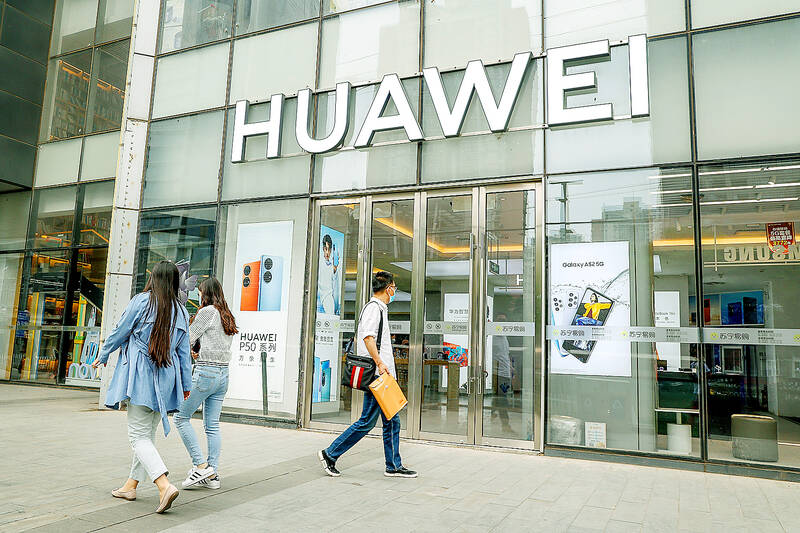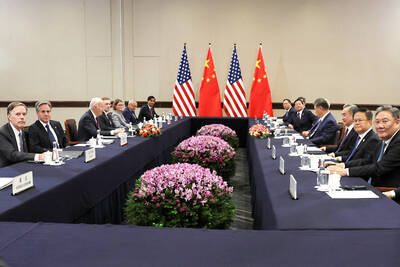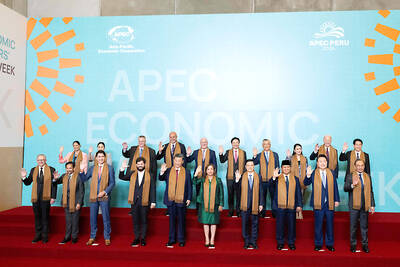The US Federal Communications Commission (FCC) is to ban approvals of new telecommunications equipment from China’s Huawei Technologies Inc (華為) and ZTE Corp (中興) in the US on national security grounds, an agency document said.
FCC Chairwoman Jessica Rosenworcel last week circulated the proposed ban to the other three commissioners for final approval.
The companies are not to be able to sell new equipment in the US without authorizations.

Photo: EPA
“The FCC remains committed to protecting our national security by ensuring that untrustworthy communications equipment is not authorized for use within our borders, and we are continuing that work here,” Rosenworcel said in a statement on Thursday.
The FCC faces a congressional deadline next month to act.
The FCC voted in June last year to ban approvals for equipment in US telecommunications networks from Chinese companies deemed national security threats, including Huawei and ZTE.
That came after a designation in March last year of five Chinese companies on the so-called “covered list” as posing a threat to national security under a 2019 law aimed at protecting US communications networks: Huawei, ZTE, Hytera Communications Corp (海能達通訊), Hangzhou Hikvision Digital Technology Co (杭州海康威視數字技術) and Zhejiang Dahua Technology Co (浙江大華技術).
The FCC in June last year said that it was considering banning all equipment authorizations for all companies on the covered list.
This year, the FCC added Russia’s AO Kaspersky Lab, China Telecom (Americas) Corp, China Mobile International USA, Pacific Networks Corp and China Unicom (Americas) to the covered list.
FCC Commissioner Brendan Carr last year said that the FCC had approved more than 3,000 applications from Huawei since 2018.
In 2019, the US placed Huawei, Hikvision and other firms on its economic blacklist.
Also in 2020, the FCC designated Huawei and ZTE as national security threats — a declaration that barred US companies from tapping an US$8.3 billion government fund to purchase equipment from the companies.
Earlier this year, the Chinese embassy in Washington said that the FCC “abused state power and maliciously attacked Chinese telecom operators again without factual basis.”

ONE LAST TALK: While Xi said that Taiwan was a ‘red line,’ Biden, in what is likely his last meeting with Xi as president, called for an end to China’s military activity around Taiwan China’s military intimidation and economic coercion against Taiwan are the main causes of tensions that are destabilizing peace in the Taiwan Strait, Taipei said yesterday while thanking US President Joe Biden for expressing Washington’s firm stance of maintaining peace and stability in the region. Biden and Chinese President Xi Jinping (習近平) met on Saturday for their third meeting and their first talks in seven months on the sidelines of the APEC forum in Lima, Peru. It was likely Biden’s last meeting as president with Xi. During their conversation, Biden reiterated the US’ opposition to any unilateral change to the “status quo” from either

Taiwan would participate in the 2026 APEC summit to be hosted by China after Beijing promised it would ensure the personal safety of attendees, Taiwanese national security sources said yesterday. The APEC Leaders’ Machu Picchu Declaration announced yesterday said that China would host the APEC summit in 2026. Beijing proposed hosting the summit shortly before this year’s gathering began on Friday, a national security official said, speaking on condition of anonymity. Many APEC members expressed concerns about China hosting the event and said that prior communication over the decision was insufficient, the official said. Taiwan brought up concerns about legal “guidelines” China announced in

SUPPORT: Arms sales to NATO Plus countries such as Japan, South Korea and Israel only have to be approved by the US Congress if they exceed US$25m The US should amend a law to add Taiwan to the list of “NATO Plus” allies and streamline future arms sales, a US commission said on Tuesday in its annual report to the US Congress. The recommendation was made in the annual report by the US-China Economic and Security Review Commission (USCC), which contained chapters on US-China economic and trade ties, security relations, and Taiwan and Hong Kong. In the chapter on Taiwan, the commission urged the US Congress to “amend the Arms Export Control Act of 1976 to include Taiwan on the list of ‘NATO Plus’ recipients,” referring to

Minister of Labor Ho Pei-shan (何佩珊) said she would tender her resignation following criticism of her handling of alleged bullying by Ministry of Labor Workforce Development Agency branch director Hsieh Yi-jung (謝宜容) resulting in the death of an employee. The ministry yesterday gave Hsieh two demerits and said she is subject to review by the Disciplinary Court. The severest possible punishment would be her removal from office and being barred from government jobs indefinitely. Workforce Development Agency Director-General Tsai Meng-liang (蔡孟良) also received a major demerit and was transferred to another position. Premier Cho Jung-tai (卓榮泰) issued a formal apology